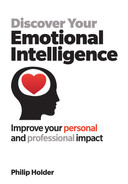part 1

What is emotional intelligence?
Emotional intelligence (EI) defines the emotional thinking process that governs those behaviours that, ultimately, shape our entire personality. EI is, therefore, about what defines us as unique individuals.
EI helps us to decide on what matters; it allows us to turn our intentions into positive action, and it describes how we take control of those often unruly, impulsive or negative feelings which stop us from overcoming many of life’s challenges. Our level of ability in identifying, understanding, improving and managing our emotions is what will ultimately enable us to adjust to a far broader range of circumstances, and thereby, be able to adapt our behaviours accordingly to suit each new situation.
Furthermore, increased EI enables us to reduce both internal and external conflict. It helps us to remove those stresses or anxieties, which stop us functioning well as human beings and so enables us to live far more rewarding and potentially more successful lives.
To be ready for whatever is likely to be coming our way, it, therefore, makes sense to develop our EI. This process has to start with improving the relationship we have with ourselves first of all, and then needs to define how we improve the relationships we have with others.
The term Emotional Intelligence was first used in ‘The communication of emotional meaning’, a paper that was written by Joel Davitz and Professor Michael Beldoch at Columbia University in 1964.
This paper no doubt led to an outline of the ‘Sensitivity to emotional expression in three modes of communication’, which Michael Beldoch also published in 1964.
Both of these papers were early explorations of the psychology of communication and behaviour in different situations, and no doubt laid the initial foundations for the further study of emotional intelligence.
It was not until 1995 when Science Journalist and Author Daniel Goleman launched his book Emotional Intelligence: Why it can matter more than IQ that the term found its way firmly into modern language and then into the contemporary world of business.
EI is still a relatively new science for something that we have been evolving, as human beings for over 200,000 years. Ergo it is still likely to continue to be a work in progress as we begin to uncover more and more of what makes us uniquely human.
